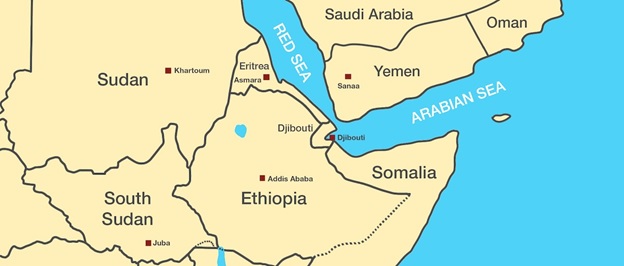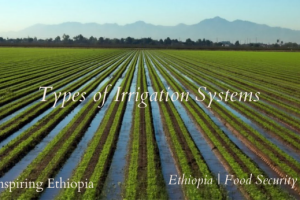
In today’s world where most economic activities are done by freights, the question of accessing to sea is the main priority to any landlocked nation. Numerous documents disclosed the importance and tremendous advantages of having a sea port and also the huge blow that a given country faces if it does not have a sea breath.
In many books and articles, scholars try to explain the advantages of having a sea port and again, they discuss on the danger that a landlocked nation may encounter. The economic and political dominance of a nation could be affected in many ways in relation to possession of sea port. Landlocked nations have been trying to avert such challenges in many directions by crafting a number of strategies.
One of the most important geopolitical regions in the world is the Red Sea area. Nations in the Horn of Africa, Middle East, and Europe share the region. Besides, other super powers of the world also have interest in the region to stay being dominant and keep power balance in the world’s economic and political arena.
Ethiopia’s immemorial history teaches how the nation used to be prominent in the world’s political, economic, and religious activities of the region when it owned ports. Besides, the country used to control most of the red sea and administer it as it was its legitimate territory.
Unfortunately, following the independence of Eritrea in 1993, Ethiopia could no longer access the sea port and became a landlocked country. The reality of becoming a landlocked nation like Ethiopia with more than 120 million people is a nightmare for any government that aspires to realize economic and political transformation.
In good truth, Ethiopia has been living with this reality using other nation’s port. It is the fact that Ethiopia is the nation that is very much closer to a sea but does not have a port. Besides, documents reveal that 95 % of the nation’s import and export activities are performed by ports, especially through the Port Djibouti. Ethiopia is also using other nearby ports such as Port Sudan, Berbera, and Mombasa.
Recently, Abiy Ahmed, Prime Minister if the Federal Democratic Republic of Ethiopia held a discussion with members of the parliament on a draft document. The document entitled “Ethiopia’s National Interest: Principles and Content,” was prepared by Ministry of Peace aimed to endorse Ethiopia’s strategic and economic national interests in the Red Sea. The notion is a long waited.
“Ethiopia should engage with other countries in the area to ensure its access to the ports and be able to overcome geostrategic impediments in this respect, the draft document noted, before such actions start to impede the development of the region,” the document stated according to local media. The government and people of Ethiopia have been affected for the past three decades due to becoming a landlocked nation.
In similar vein, Prime Minister Abiy stated that the grand Ethiopian strategies to this and the coming generation in the first place are peace and unity. “Peace is the foundation of all, and we must also be united. Together, we become powerful and weak when we become scattered,” Abiy said. The second strategy is comprehensive prosperity by bringing together economic, social, and value advancements. On top of that, as to the Premier, understanding the geopolitics is crucial.
The issue of the Red Sea, Nile, and the Horn are vital points that need discussion and work on. Talking about the relationship between Ethiopia and water, as to the Prime Minister, the country is like an island surrounded by water but also yearning for water. The neighboring nations have calculated possession on both the Red Sea and Nile River, but not Ethiopia. “The Red Sea and Abbay (Nile) are the two pillars that determine and define Ethiopia’s future,” Abiy noted.
Prime Minister Abiy said it is quite absurd for Ethiopians and the parliament being silent not to raise the issue of the Red Sea while other countries get the rights to discuss about Ethiopia’s GERD and other trans-boundary rivers for mutual benefits.
To this end, the UN Charter agreement expresses that Ethiopia has a legitimate right for adequate access to sea due to “its geographical proximity, historical background, population size, and economic reasons. It is better to see this agreement,” Abiy said.
The population was just 50 million at that time, and now it is going to be 150 million by 2030. It is unable to imprison 150 million people. It will blast sooner or later unless allowed access to sea. Therefore, it is better to bring the issue to the table and discuss it centering mutual benefit. It seems easy to live a life as a landlocked nation for thirty years, but when the time goes, it will be unable to continue this way. That is why it is better to discuss the issue sooner than later.
Abiy further explained that every Ethiopian Neighbor receives water from Ethiopia. For Djibouti, in particular, Ethiopia installed a pipe line and paying for the electricity to supply fresh water. No neighboring country gives a drop of water to Ethiopia. While those nations have the right to receive water from Ethiopia but ignore the idea of discussing about accessing to sea, it is not right. Thinking about living together through sharing resources must be implemented in a balanced and peaceful manner, the premier underlined.
Prime Minister Abiy also cited the saying of Alula Abba Nega, one of Ethiopia’s most renowned generals and politicians; “The Red Sea is the natural boundary of Ethiopia and will live to be.” The Ethiopian Aksumite Kingdom also administered the Red Sea in its time. Ethiopia’s proximity to the Red Sea determines the power and dominance of the nation. The historical aspect of accessing the sea is a fact.
“In addition, the demography also matters. There are ethnic societies like the Afar tribe with similar cultural and religious values but lives in three different countries: Ethiopia, Eritrea, and Djibouti. Again, Somali tribe mainly lives in Ethiopia, Djibouti, Kenya and Somalia. Somalis in the neighboring countries can access either the Red Sea or Indian Ocean, so why are the Ethiopian Somalis denied accessing the sea?,” the Premier asked.
Furthermore, Abiy elaborated, “There are 44 landlocked countries in the world. Of these, there is no country closer to Ethiopia with larger number of population. It is hard to accept that a country with 120 million populations is landlocked.” Seventeen of those landlocked nations are from Africa including Ethiopia, and Ethiopia accounts one third of the population of these countries combined. In this regard, the notion of accessing to the sea is the question of existence for Ethiopia.
Many nations like Turkey, UAE, and others have invested on the region; so, why not Ethiopia? “If other questions appear, then we are okay to do business by our mega resources such as GERD, Ethiopian Airlines, and telecom to give some percent of share and get a sea access in one of the ports in the Red Sea in return. It should be a win-win approach.”
“A United Nation’s study shows that 25-30 percent of a nation’s GDP is port,” Abiy said. There is no country that is close enough to the sea and still landlocked. Leaders of the nations, thus, should sit down and think for the generations to come in order to live in harmony.
Economically, as to the Premier, a person called Tim Marshal said that being a geography prisoner is like accepting poverty. Ethiopia has every potential to be powerful in the region. The nation has the population, resource, and skilled manpower to be powerful.” However, being a landlocked country hinders the nation’s progress to become African superpower. Zeila, Djibouti, Adulis, Assab, and Massawa ports could be Ethiopia’s option for accessing to the sea.
Having a sea port brings blessing to the nation. To get the sought objective, peaceful negotiation is the ultimate tool. The choices could be establishing federation or confederation, or giving something in substitution. Ethiopians should also get prepared for talking on the narrations, diplomacy, and in psychology. “If we do not do it now, we will leave hard homework to our children,” the premier stressed.
BY DANIEL ALEMAYEHU
The Ethiopian Herald October 19/2023




